The gruesome on-duty deaths of two Memphis sanitation workers on Feb 1, 1968 spurred a series of events that forever changed the struggle for worker safety and civil rights.
Now, 50 years later, the fight for safe working conditions and to establish and maintain our collective voice on the job is still continuing in 2018 — and we refuse to back down or forget.
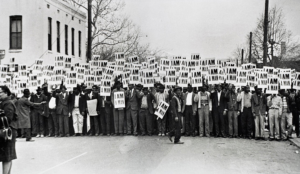
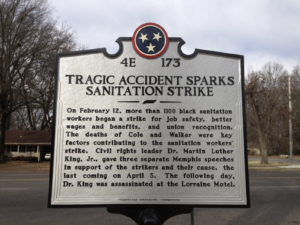
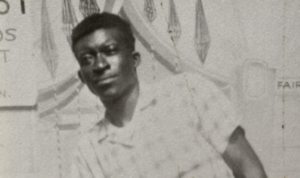
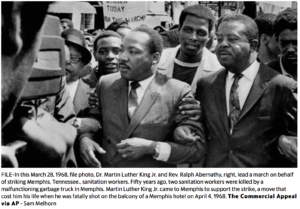 Sanitation workers with SEIU 721 and AFSCME gathered at the Los Angeles City Hall on January 31 to hold moments of silence in memory of their fallen sanitation brothers, Echol Cole and Robert Walker. The SEIU 721 Executive Board also marked the 50th anniversary at their meeting on February 1.
Sanitation workers with SEIU 721 and AFSCME gathered at the Los Angeles City Hall on January 31 to hold moments of silence in memory of their fallen sanitation brothers, Echol Cole and Robert Walker. The SEIU 721 Executive Board also marked the 50th anniversary at their meeting on February 1.
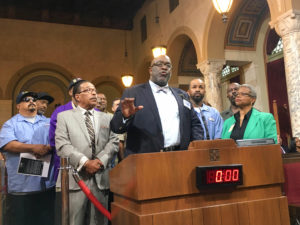
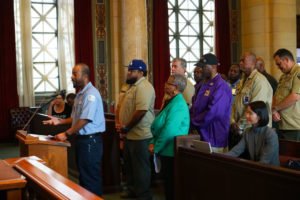 Tragically, the men were crushed to death in the compactor of a faulty city garbage truck, and their deaths led to the Memphis Sanitation Workers Strike 12 days later. More than 1,300 sanitation workers — fed up with unsafe working conditions, poverty wages, and the city’s refusal to recognize their union, AFSCME Local 1733 — took to the streets carrying now-infamous placards declaring “I Am A Man.”
Tragically, the men were crushed to death in the compactor of a faulty city garbage truck, and their deaths led to the Memphis Sanitation Workers Strike 12 days later. More than 1,300 sanitation workers — fed up with unsafe working conditions, poverty wages, and the city’s refusal to recognize their union, AFSCME Local 1733 — took to the streets carrying now-infamous placards declaring “I Am A Man.”
Dr. Martin Luther King, Jr. went to Memphis to support the workers and delivered his “I’ve Been to the Mountaintop” speech to them on April 3, 1968. He was shot and killed the very next day.
It wasn’t until Dr. King’s assassination that the City of Memphis finally recognized the workers’ demands and put policies in place that brought an end to the strike.
The fight for workplace safety and maintaining our unions continues in the face of the “Right to Work (for less)” attack, which even Dr. King spoke out against, calling it a “false slogan” designed to “rob us of our civil rights and job rights.”
 According to the US Bureau of Labor Statistics, sanitation work is the fifth-deadliest job in the US, with fatality rates and safety issues even worse for non-unionized workers. LA City Sanitation worker and SEIU 721 E-board member Simboa Wright said he’s proud his profession was so pivotal in Civil Rights history and wants the public to remember how vital sanitation workers are to our communities.
According to the US Bureau of Labor Statistics, sanitation work is the fifth-deadliest job in the US, with fatality rates and safety issues even worse for non-unionized workers. LA City Sanitation worker and SEIU 721 E-board member Simboa Wright said he’s proud his profession was so pivotal in Civil Rights history and wants the public to remember how vital sanitation workers are to our communities.
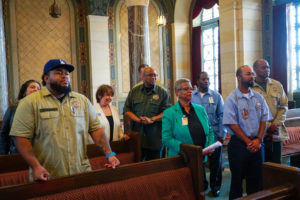
“These sanitation workers in Memphis just wanted rights, safety and to have a union. Fast-forward 50 years later and we’re still faced with the same thing, trying to keep our unions that these people died for and gave their blood, sweat and tears for,” he said. “Dr. Martin Luther King went down to Memphis against “Right to Work” and so for history to repeat itself in 2018 is just ridiculous. That’s why we’re continuing to fight and that’s why we refuse to let them be forgotten.”
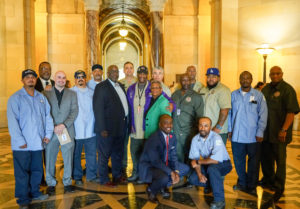
 Share
Share
 Share
Share